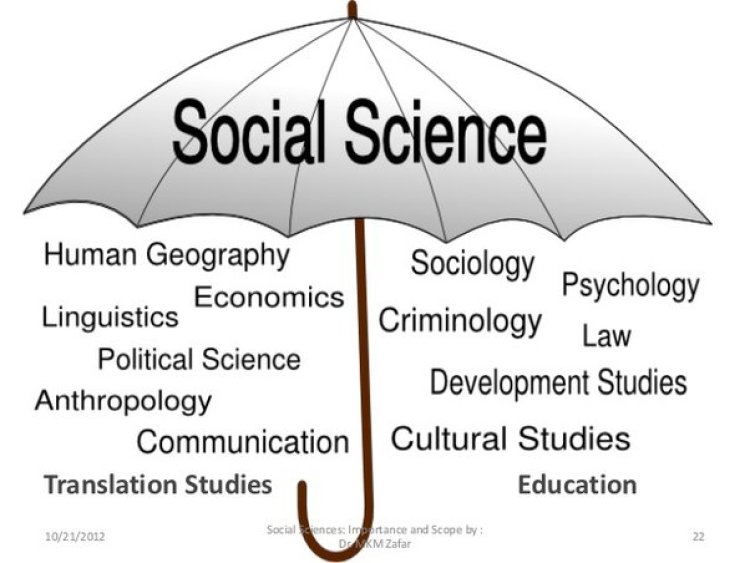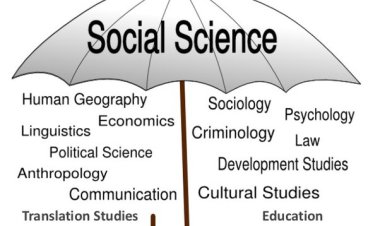Social Scienc Career
Human behavior and societal dynamics are among the many topics explored by social scientists. Majors in psychology, politics, and economics are among the most well-liked in the social sciences.

Social Science: What It Is and the 5 Major Branches
What Is Social Science?
Human interactions are the focus of social science. Anthropology, economics, politics, psychology, and sociology are all considered to be sub-fields of social science.
Everything from the reasons for economic growth and unemployment to the factors that make people happy are all fair game for the researchers who study social systems. The results of these studies have far-reaching implications for public policy, education, urban planning, and even marketing.
MAIN POINTS
- The study of human interaction in social settings falls under the umbrella of social science.
- It aims to explain social dynamics by delving into issues such as economic growth, unemployment, and happiness.
- The 20th century saw the rapid rise of the social sciences as a distinct scientific discipline.
- Jobs in advertising, economics, psychology, education, management, and social work are all common among social scientists.
- Typically, social scientists place a greater emphasis on interpretation and qualitative research methods.
Understanding Social Science
As a distinct academic discipline, social science stands apart from the natural sciences like physics, biology, and chemistry. Instead of focusing on the physical world, social scientists look at how human beings interact with one another and how societies function. The use of interpretive and qualitative research methods is more common in these fields of study.1
Digital Commons at the University of South Florida. Page 1 and Page 2 of "Social Science Research: Principles, Methods, and Practices" (Pages 10 and 11 of the PDF version).
Branches of Social Science
Various sources list anywhere from four to seven different types of social sciences. Though experts disagree on precisely which fields should be included, they do agree on the following five:
- Anthropology
- Economics
- Science of Politics
- Sociology
- Sociological theory
Some people classify history as a social science, although most historians place it more closely with the humanities. Humans are the focus of both the humanities and the social sciences. The methodology used to produce these results is what sets the humanities apart from the sciences.2
Page 5 (Page 14 of PDF) of "Social Science Research: Principles, Methods, and Practices," published by the University of South Florida's Digital Commons.
Similar to geography, the study of law has some roots in the social sciences.
Importance:The discipline of social science is vast. Some people also include history, criminology, and geography in this conversation, but the five basic ones are anthropology, economics, political science, psychology, and sociology.
Social Science in Schools
In the United States, students are introduced to the fundamentals of social science beginning in elementary school and continuing through high school, with an emphasis on economics and politics. More specialized fields of study are available at the university level.
Numerous social science majors are available at today's schools and universities. The University of California, Berkeley, for instance, is home to fifteen social science-focused academic departments. To name a few:
- The Study of African Americans
- Anthropology
- Science of the Mind
- Demography Economics
- Research on Different Ethnic Groups
- The study of women and gender
- Geography
- Examining the World
- History
- Linguistics
- Economics and politics
- Science of Politics
- Psychology
- Sociology3
Colleges and universities' master's and doctoral degree programs allow students to specialize even more.
Social Science Careers
Jobs in advertising, psychology, teaching, law, management, social work, economics, and politics are all common among social scientists.
Any thriving enterprise would benefit from having a deeper understanding of the social science topics of human behavior, relationships, and attitude shifts over time. Numerous industries regularly make use of social science theories and methods, particularly those of demography, politics, and sociology. Advertising and marketing experts, for instance, frequently apply insights from psychology and sociology to improve their approach to reaching customers.
Economics, a subfield of the social sciences, is obviously very important to the commercial world. Business, sales, and other market trends are studied and forecast using economic analysis and quantitative methodologies by many sectors. Behavioral economists, who apply psychological principles to the study of economics in order to better understand and predict human and organizational behavior, are among the most in-demand specialists in the United States.
From 2021-2031, economists are expected to have a 6% increase in employment, which is on par with the average 8% increase anticipated for all occupations by the BLS.4 The Bureau of Labor Statistics projects an identical rate of growth (9%), from 2021-2031, for the employment of social workers.5
Read Also:https://pathshalas.com/science
Social Science Wages
According to the BLS, persons with social science degrees should expect to earn more than their non-degreed counterparts. It found that in 2019, the average salary for a graduate of a social science program was $64,000, or $4,800 more than the national median.6
Some careers in the social sciences pay considerably more than others, but this is to be expected. A social worker's median salary was $50,390 in 2021, whereas an economist's was $105,630.78, from the BLS (US Department of Labor). Summary of the Social Worker Section of the Occupational Outlook Handbook.
History of Social Science
Social science as we know it now has its roots in ancient Greece.9 Their lives and the earliest inquiries into human nature, the state, and mortality shaped Western culture.
The academic discipline of social science emerged during Europe's Age of Enlightenment (also known as the Age of Reason), which lasted for the better part of the 18th century. The study of social science in the West was founded by prominent thinkers such Adam Smith, Voltaire, Jean-Jacques Rousseau, Denis Diderot, Immanuel Kant, and David Hume.10
People started to be more methodical about recording and analyzing the data they gathered about the world around them. Language and psychology, for example, are two branches of the same tree that split apart from one another throughout time. Discover more about the five main subfields below.
Anthropology
Although anthropology, the study of human civilizations and cultures, has been a focus point for millennia, it was during the Age of Enlightenment that it truly took off and gained importance. Human behavior analysis was seen as crucial to the period's overarching goal of societal and intellectual progress.11
Economics
Plato, Aristotle, and Xenophon were only a few of the ancient Greek philosophers who contributed to the development of economic thinking. Their research paved the way for the study of practically every branch of social science, including economics. The economic system of mercantilism flourished during the 15th through the 18th centuries, when global travel and trade became more accessible to more countries. The idea that a government should prioritize exports over imports suddenly drove the economic policies of numerous states.
Authors like Smith, widely regarded as the father of modern economics, pushed back against this dominant school of thought. The theories of Smith, Rousseau, and Locke laid the groundwork for classical economics, which advocates for a market economy that regulates itself. Many current politicians read Smith's The Wealth of Nations and respect his work.
John Maynard Keynes and Karl Marx are two more major figures who have influenced modern economic thought. By stressing the importance of labor above capital, Marx notably argued against the viability of capitalism as an economic model. Marx's critique of capitalism has influenced many philosophers, despite the fact that his theories are not supported by most politicians today.
Meanwhile, Keynesian economics enjoys widespread support in the field at present. Keynesian economics, the first to distinguish between the study of economic behavior and markets based on individual incentives and the study of broad national economic aggregate variables and constructs, is a demand side macroeconomic theory that focuses on changes in the economy over the short run.12
Political Science
Political science has its roots in ancient Greek thought. When it came to politics, justice, and what makes a successful government, ancient Greek philosopher Plato wrote a lot.
The scientific method would eventually be applied to Plato's early writings thanks to the efforts of philosophers like Aristotle, Thomas Hobbes, Karl Marx, and Max Weber. Democracy was strengthened by centuries of study, which also aided politicians in making popular policy decisions and winning elections.
Psychology
The study of psychology has become increasingly popular in recent years. As a medical discipline, it emerged in the late 1800s and gained traction in the Western world throughout the 20th century, largely due to the contributions of Sigmund Freud.
13
In 2019, 20.3% of adults in the United States have sought out mental health care, as reported by the Centers for Disease Control and Prevention (CDC).
14
More and more people are turning to practices like yoga and mindfulness meditation in addition to traditional talk therapy in order to deal with mental health difficulties, but many still utilize psychiatric medicine.
Psychiatric care is becoming increasingly accessible thanks to advances in neuroscience, pharmaceuticals, and a wide range of psychotherapeutic modalities. Other subfields include studies of animal cognition, social psychology, and economic psychology.
Sociology
In the middle of the 1800s, a time of significant social change, sociology emerged as a scientific discipline in Europe. Early sociologists wondered how to maintain stability in the face of such rapid change as was brought about by political revolutions and the Industrial Revolution.
15
It was at Yale University in 1875 that the first American course in sociology was offered. After that, more universities began offering courses on the topic, and by 1911, it had made its way into secondary education as well.
16 17
Teaching Sociology, Volume 33, Number 4 (October 2005), Pages 345–354; Michael DeCesare, "The High School Sociology Teacher."
What Are the 5 Major Branches of Social Science?
Anthropology, economics, political science, psychology, and sociology are the five primary sub-disciplines that make up the field of social science. There are many who classify history, the law, and geography as additional fundamental aspects of the social sciences.
Why Is Social Science Important?
People gain a better understanding of how to examine not only their own behavior, but also the behavior and motivations of their peers, via the study of the social sciences, which is one reason why these fields are so important. The study of social phenomena also helps us develop a deeper comprehension of how to design organizations that are both more inclusive and more successful.
Which Jobs Can You Get With a Social Science Degree?
A degree in the social sciences can help you get a job as an economist, psychologist, or survey researcher. It can also help you open doors to chances in other fields, such as the legal field, the government, or academia.
The Bottom Line
A better understanding of our contemporaries and the culture in which we find ourselves can be attained through the study of social science. Understanding human behavior is essential, and doing so should, in principle, result in increased productivity and an improved standard of living for all individuals.
Trade on the Go. Anywhere, Anytime
You are welcome to trade crypto assets on one of the major exchanges in the world. While trading safely, you can take advantage of competitive trading costs and devoted customer assistance. You will also gain access to Binance's features, which will make it much simpler than ever before for you to examine your trade history, control auto-investments, view price charts, and conduct conversions with no additional fees. You may join the millions of other traders and investors on the worldwide cryptocurrency market by creating an account for free.












